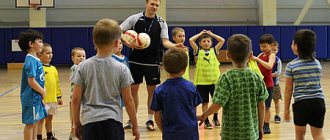The development and formation of personality largely depends on how an adult communicates with the baby, what knowledge and skills he transfers to him. The upbringing and development of young children is not an easy task; it cannot be reduced only to attending a nursery or training sessions; the participation of the family as the main educational factor is extremely important. Thus, parents need to know and take into account the peculiarities of raising young children; this will certainly bear fruit.
Don't try to conquer chaos
It is useless to deny chaos and also useless to fight it. With the birth of a child, it will still overtake you. After all, children do not live according to the laws of adults. They create their own rules and are able to change the parent’s entire life plan. Be patient and accept the mess. He is now in your life for a long time.
“With the birth of children, the forces of chaos enter your life. At the same time, relying on some kind of schedule in your affairs is like navigating your way through a hurricane. When a strong wind blows, there is no time for routes. You need to understand this and come to terms with the inevitable. If you don't come to terms, you will fight chaos. You will complain about your failures, blame yourself and others for them, try to correct the inevitable, and be disappointed. Treat it with the calm of a true Zen Buddhist."
Cartoons and other educational aids
In raising children correctly, parents always have an assistant - cartoons. Children love them - most parents remember this from themselves. This is an ideal way to distract a child, put him in a good mood and even teach him many useful things. But this same assistant can also turn out to be a different side, not so rosy. What does this mean and how to avoid it?
Cartoons for a child are the least energy-consuming way to perceive the world. To perceive a book, you need to listen carefully, use your imagination, imagine characters and action; In cartoons, everything is already shown - all you have to do is watch. The child uses less mental effort and simply passively looks at the screen. Even if a fascinating, thoughtful, intricate plot unfolds in front of him, he does not need to make an effort to understand it.
In addition, sitting in one place for a long time and looking at one point is not good for your health. This also harms adults, not to mention the period when the body is just forming. The child needs to develop physically - move, play with friends, be in the fresh air. If he watches a cartoon not alone, but in a group, communication also occurs, but first of all, children are still captivated by the plot.
In addition, developing vision also suffers. Many ophthalmologists are against allowing children under three years old to watch cartoons at all. One may not agree with this, since this topic has not been fully explored. But one thing remains mandatory: when children watch cartoons, it is important to follow certain rules.
The screen should be well lit - that is, the child needs to turn on cartoons either during the daytime or in the evening with the lights on. A bright screen in a dark room produces too sharp a contrast and puts extra strain on your eyes.
A long trip on public transport is a great temptation to occupy a child with a tablet. However, if the trip takes place on a rough road, when the bus or car is constantly shaking, this is also not good. Even adults are not recommended to read on the bus, because the distance between the eyes and the book fluctuates all the time, let alone children’s eyes. Therefore, if you have a long trip ahead, take a game for your child, play words with him, tell him a fairy tale, or just talk.
Take breaks. Don't let your preschooler look at the screen for more than half an hour - pause and invite him to drink juice or do something around the house that he likes. Set a rule: one cartoon a day. And if we are talking about a long, full-length cartoon, split it into two days.
In addition to physical health, there is also a psychological factor. What will a child take away from the cartoon? Will what he saw affect his psyche, will he develop anxiety or aggressiveness? Look through the cartoons you turn on for your child and think: do you want him to liken himself to the main characters? Watch with him and discuss. Listen, if he wants to talk about the plot and characters, ask questions.
There are also educational cartoons: they teach English, rules of behavior, talk about letters and numbers and many other useful things. Many admit that their children enjoy watching such cartoons, they actually learn and grasp the material better than with them. This is a really convenient invention. And yet this is not a substitute for parents. Discuss with your child what he has learned, give him tasks to repeat. And follow the same hygiene rules as with regular cartoons.
As children get older, cartoons also become a means of socialization for them. How can he not watch something when everyone in his class is into it? Moreover, as a child grows, his tastes sometimes begin to sharply disagree with the beliefs of his parents. Parents begin to sharply criticize, prohibit watching - and this has never benefited anyone.
Therefore, even if you can’t stand any zombie dolls, take the time to figure out what they are and what ideas your child can glean from them. Watch one episode together, watch how he reacts. And don't let prejudice come between you and your child.
The same goes for films. Children can watch something that, according to their parents, is absolutely terrible - action films, horror films. This is part of their growth process, the need for thrills, and if the child has friends and has no problems with most of the school curriculum, then he is developing normally.
And one more related topic. What is the child reading?
Books are an even greater help in raising a child. But among them there are good ones, and there are also bad ones. How to develop a child's taste and love for reading?
A child who makes friends with books at an early age will be fascinated by them for life. Therefore, if you want your child to grow up educated, erudite, an interesting conversationalist, and able to formulate his thoughts, read more with him.
Read it yourself too. At the very beginning, we said: the best way to teach a child is to show by example. This also applies to reading.
Read to him at night and come up with your own alternative versions. Talk about the characters: who did what and why they did it. Watch movies based on books and discuss the differences.
Give him books of different genres: adventure, historical, about animals, about his peers. The more he reads, the better his horizons will develop.
Over time, the child will develop his own tastes and preferences. If you did everything correctly, then he will not bring obvious waste paper into the house. And even if you don’t like his choice, try to understand what he found in it, find something on a similar topic for him. Show that even if you don't like his choice, you will accept it.
What about harmful inventions like computer games and social networks? There is nothing terrible in this either, if otherwise the child develops normally: has friends, hobbies, and takes his responsibilities responsibly. Agree with him on a schedule: sitting at the computer is harmful to posture and vision, so the teenager sits at it under certain conditions: no more than the established time - one and a half to two hours; Every half hour he takes breaks and gets up.
And one more important condition in such an agreement: let him turn on the computer only after schoolwork and household chores are completed. In this way, the child will learn responsibility and discipline and get used to following the rules that are important to him.
Don't dwell on bad behavior
Instead of constant reproaches, pay attention to the good. Praise your child and explain to him why exactly you rewarded him. This method is more effective than comments and dissatisfaction.
“If you feed something, it will grow. If you don't feed it, it will gradually fade away. It's a simple principle, but most who have trouble communicating with their children either miss it or have never thought about how or what behavior they are actually rewarding."
How to raise a child correctly
When a woman becomes a mother for the first time, raising a child is not easy for her at first. She may face a barrage of criticism from all sides - from her own parents to random passers-by. Everyone considers it their duty to inform her that she is holding the child incorrectly, feeding, dressing and handling him incorrectly. Sometimes these tips can be really useful. But often advisers contradict each other, do not see the whole picture, and do not always rely on truly useful life experience.
What to do and who to listen to?
First of all, remember: advice is good when asked for. Many women complain about the unceremoniousness of strangers and sometimes don’t know what to do about it. Therefore, determine for yourself a narrow circle of those who will be an authority: a pediatrician, one of the classics of child rearing. Many people rely on the experience of their mother, sister or friend. Determine for yourself whose opinion will have weight.
And at the same time, remember: you are responsible for the health of your child, especially when he is very young. Do not rely on unverified sources. Before you come to a definite opinion, review several reputable resources. Before trying a new technique or drug, talk to your pediatrician. And if you communicate on forums, pay attention to how competently the user writes and how well-groomed and happy his children look if he shows their photos.
Advice from strangers can also be useful. For example, if this is the third person in the past half hour who says that your child is hot, think about it: maybe you really shouldn’t have put a hat on him at +20? It's exaggerated, but it happens.
Don’t be shy to ask for help if you don’t understand something or don’t have time. Remember: first of all, a child needs healthy and calm parents.
What tips for raising children are classics for all times and occasions? What are the basic principles? What must be taken into account so as not to miss the most important moments in the development of a child?
To answer this question, let’s first figure it out: what is correct, complete education?
Different schools of education have different approaches. But there is something constant, obligatory, no matter what technique is used.
The basic requirements for education are:
- obligation;
- complexity;
- equivalence.
What does all of this mean? Let's take a closer look.
Established rules cannot be applied from case to case when it is convenient. They must be adhered to completely. This includes, for example, adherence to the regime. During the school year, the child goes to bed and gets up at the same time; During the holidays, relaxation often sets in - playing until late and then sleeping until noon. As a result, at the end of summer it will be difficult to readjust to the original regime, and this results in soreness, irritability and quarrels. So - even if circumstances change - leave the rules adopted for the child as unchanged as possible. This will benefit him: precisely in the absence of stability, children become more restless, and clearly established boundaries give a feeling of ground under their feet.
From the principles of education, you cannot choose only what seems right and easy. Any technique works when it is used in combination, without omitting details. If you only scold a child and consider that he does not deserve praise, he will grow up intimidated; if you never criticize, he will become self-confident and will take blows more painfully - because he is not ready for them.
And besides, none of the principles of education are less important than others. Teaching a child to express emotions is as important as teaching him to help around the house, and pocket money for a growing personality is no less important than clothing and food. Don’t neglect what the child himself considers important.
Raising a child is more than just feeding, clothing and turning on cartoons. Parenting involves many areas of life. Let's focus on these types:
- labor;
- emotional;
- social.
Never deny your child attention
The child truly craves the attention of an adult. It is important for him to know that you are really listening and looking at him, and not soaring somewhere in the clouds, thinking through your adult affairs. Show your interest and spend quality time with your child without being distracted by your phone.
“Like real piranhas that can eat a cow in a few minutes, children pounce on any attention, which they never get enough of. They are ready to do anything to be noticed, even if it harms not only others, but also themselves. <…> For piranhas, the main goal in life is to devour everything that gets in their way. For children, the main goal in life is to constantly attract the attention of others, no matter what the cost.”
Features of young children
Understanding the differences of this period allows us to establish effective learning and development of young children. It is on these basic concepts that work in a preschool institution is built.
Age Features:
- Physical development. Motor skills are sharpened. By the age of 3, babies move quickly, jump, and climb to small heights. The brain still maintains a low limit of performance, fatigue occurs quickly.
- Speech and communication. The main achievement is the first words and phrases. They are used to communicate with adults, and the transfer of speech experience occurs through imitation. The vocabulary is actively replenished, meaningful sentences are formed. Kids are able to perceive music and children's literature and respond to them.
- Emotional and personal development. It depends entirely on the attitude of the adult. Preschoolers are trusting and easily respond to affection and attention. They feel subtly when parents are happy with their behavior and when they are not. They are willing to help and learn the rules of behavior in society.
Early childhood is a period of active development of cognitive processes:
| Cognitive process | Its characteristics at an early age |
| Perception |
|
| Attention |
|
| Memory |
|
| Imagination |
|
| Thinking |
|
Create boundaries for your child
Children need boundaries, otherwise they simply do not understand how to live in our big world. Clearly outline the boundaries beyond which you cannot go. Then the child will not irritate you or confuse the people around you.
“It’s the nature of children to move forward until they hit some obstacle. For some children, it’s enough just to know that an obstacle exists, others need to push against it several times with all their might, but everyone needs boundaries. A world without borders is a very dangerous and frightening place for a small person.”
How to Raise Children: Emotional Development
Children usually have no problems expressing their emotions. But there is also such a thing as emotional intelligence - awareness of your emotions and the ability to connect them with your desires and actions. If there is no such skill, then in adulthood there may be problems with expressing and understanding one’s emotions. This results in the inability to express one’s needs, difficulties in making contacts, and similar internal conflicts.
How to avoid this?
The child grows up, encountering unknown sides of the world and discovering his own character from a new side. Its borders are constantly expanding, and more and more incomprehensible events are appearing. And, naturally, he does not always know how to behave and how to react. And he splashes out his emotions in the ways that are available to him.
All children have different sensitivity thresholds. Someone may be upset or angry by someone's innocuous remark. Don't laugh at this - show your child that he can come to you with his problems and receive understanding. No matter how small the reasons may seem, for a child, with his tiny life experience, they are considered huge.
Don’t deny his feelings - “this is all nonsense”, “good girls don’t cry” - but show your child that you love him, even if he is angry or capricious. Show that you understand him: “yes, it’s offensive,” “I see that you’re sad.”
Teach your child to express his feelings in words. “I’m sad because you’re sending me to bed and I haven’t finished drawing yet.” “I was offended when my grandmother said that I had thick cheeks.” This skill will help in the future to avoid conflicts, misunderstandings and misunderstandings.
When reading fairy tales or watching cartoons with your child, often ask him: “What do you think the hero felt? How would you feel? What would you do in his place? This will help the child not only learn to cope with his emotions, but also take into account the feelings of other people.
It is important to let the child “throw out” and feel his emotions. Anger or irritation is unpleasant, but it is part of the psyche, and to suppress it means to suppress the personality. Someone will want to make the child “more comfortable,” but then unlived emotions accumulate like a snowball. Set boundaries and support for your child: he expresses his anger only in his room, but you will definitely be there to hear him.
Take whims seriously
Pay attention to your child's behavior and whims. In this way he expresses what he is not yet able to say in words. Every gesture, grimace and antics of your child is an appeal to you or a protest. Just be careful.
“Behavior is simply a form of communication. Climbing out of a window at night and running away from home is a kind of saying. Children are much more willing to express their thoughts and feelings through behavior than through words. The main reason is that they still have few words. They have a lot of feelings, but they don’t yet know how to choose the right words and expressions to express these feelings.”
Development and education of preschool children
Article on the topic: Development and education of preschool children.
“Every preschooler is a little explorer who happily discovers the world around him.” It is in preschool age that the foundation is laid for the subsequent full development of the child. This is the time when the development of the brain and basic body functions is enhanced. At this stage, during the development and upbringing of children, key character traits are laid down and the child’s temperament is determined. There are four of them: choleric, melancholic, sanguine and phlegmatic. A child's development largely depends on his temperament.
Younger age is the first stage of the bright manifestation of temperament. Adults must take into account the type of nervous system when raising children. Moreover, when the child is still small, by creating certain living conditions and targeted upbringing, you are able to influence the manifestations of pronounced temperamental characteristics and direct the child’s emotional development in the most favorable direction.
The development and upbringing of preschool children is primarily determined by their mental and physical capabilities and the type of thinking characteristic of their age. At this stage of development, the child’s thinking is strongly intertwined with his practical activities and is based on clear examples. Accordingly, educational methods should be based on the study of objects and their properties. The main tool for the development and education of children at this age is play. It is during play that the child develops naturally, without coercion. He gradually learns new things about the phenomena and objects around him, learns to communicate with other children.
The main driving force in the development of a young child is cognitive interest. The main task of raising children of this age is to actively develop curiosity and help in the timely expansion of the child’s horizons.
In the process of upbringing, it is very important to instill in a child an understanding of how to act and communicate with other people, and how not to. This is greatly facilitated by raising children in a team, no matter whether it is classes in a development center or a kindergarten group. A pronounced feature of the development of children at this age is that at this stage interests and a propensity for specific types of activities are formed. The goal of education at this period of development will be to instill in the child initial ideas about various areas of activity. High-quality preschool education will play a decisive role in his later life, his intellectual, physical and spiritual development.
Allow your child to argue with you
It’s normal to argue and defend your opinion. Teach your child how to conduct constructive dialogue and discussion by example. Then you won't end up with a typical, foaming-at-the-mouth debater.
“At the same time, you don’t need to be a dictator who suppresses the slightest signs of disagreement. It is natural to disagree and argue. Showing disrespect is another matter. Arguing proves that you are doing your job as parents. They show that children are growing up and that they have their own opinions about everything.”
Social education of a child
Children in public places is a broad topic that gives many people justifiable reasons for grievances. In order for a child to be able to interact with the world to mutual pleasure, it is important to teach him correct behavior from early childhood. Of course, it is impossible to explain to an infant that his crying bothers other people, but you can step aside with him and rock him to sleep; in the end, at least calmly and kindly apologize to those who are forced to be nearby - people are usually understanding towards those who treat themselves the same way.
And as the child grows, it is even more important to monitor his behavior. He lives among people, so it is important for him to understand the rules of behavior in society. Explain to him that a necessary feature of an adult is the ability to get along with people and find compromises. And at the same time, it is important for a child to have an understanding of his own rights.
Tell your child that every person has the rights to health, rest, and respectful treatment. Everyone, including him. And his freedom to do whatever he wants is limited by the rights of other people.
Explain this from childhood using simple examples. He may ask another boy or girl for a toy, but must be willing to share his own in return. No one has the right to take away his toy - but he himself cannot take away toys from others. He can politely ask other people for help or favors, but it is also advisable to help himself if asked.
Besides this, there are other points. Let's say, for example, that a child is shy around strangers - at home he is active and sociable, but in public he gets lost. It is unlikely that he will be able to quickly get along with a dozen unfamiliar children or become the star of children's parties. In such cases, do not scold him or intimidate him by saying that it will be difficult for him to live.
But being alone is also not an option, he needs to socialize, so teach him to make contact with other people. Let him pay for the purchase to a friendly saleswoman or talk to family friends. One way or another, he will have to learn a lot in order to feel comfortable in society.
Children learn easier than adults. They have a more flexible psyche, greater openness and responsiveness. If you instill in him the right inclinations from childhood and develop his natural abilities, then in adulthood he will have both friends and a successful career.
And at the same time, do not forget about the safety of the child. You cannot talk to strangers, you cannot go anywhere with them, open the door for them, or get into the car with them. Let the child be open to the world, but remember that the main authority for him remains his parents and their words.
Act intelligently
Try to plan ahead how you will raise your child. What actions and decisions may be required of you in the future. What are you hypothetically willing to do, and what do you completely disagree with?
“The only thing that happens unexpectedly is surprises. It is unlikely that you will want to rely on chance in raising your children. I've seen parents leave things to chance—you'd better not do that again. It’s much better to approach parenting purposefully, with a specific plan of action.”
Early Childhood Development
The basics of raising young children follow from the characteristics of the child’s psyche and thinking. Leading activity is objectively active.
Due to the fact that actions with objects come to the fore, the adult’s task comes down to cooperation, during which the child learns to handle them. He learns how to use them by imitating adults. The baby is able to understand the basic properties of objects (color, shape, size) and distinguish between them. By the end of his early years, he will learn to use many things around him and play with toys.
Teaching young children comes down to the following tasks:
- Speech development.
- Getting to know the outside world and society.
- Sensory development.
- Skills in handling objects.
- Improving motor activity.
- Musical perception.
Teaching play to young children is now coming to the fore. It is important to create an environment in which they actively participate in the learning process. Restriction of freedom of movement during classes is unacceptable. The mental characteristics of age will not allow children to concentrate on the material.
Learn to listen to your child
An extremely important and irreplaceable rule. Build a trusting relationship with your child. Try to have open dialogues on any topic and always listen to him. Your child, no less than others, needs respect and full communication on an equal basis with the adults around him.
“Communication, or lack thereof, is at the root of most intrafamily conflicts. In my office, I saw many people who shouted at each other for hours, and yet none of them even tried to listen to anything other than their own voice. If you can't communicate properly with your children, then you're just asking for trouble in the family."
Review of the book by Nigel Latta
Labor education of children
Many parents protect their children from household responsibilities, believing that their beloved child will still have time to work hard in his long life. But this is exactly the point: sooner or later the little person will have to make efforts himself, and if he is ready for this, it will be easier for him.
Some mothers feel pleasure when they say that their child does nothing without them: in such cases they feel important and irreplaceable. But in such cases, there is a real dependence of the child on the mother, when he is much less than he could be. Don’t develop your child’s dependence on yourself, don’t make him feel bad without you. Make him feel good with you.
Develop affection in him instead of dependence. This is a different type of relationship - when people feel good together, but separately they do not become weaker and more helpless. Give your child as many skills as possible - and you will become a friend and authority for him and earn his respect.
The more skills a child has, the more freedom he has, even if these skills will never be useful to him. For example, if he knows how to cook soup, he has a choice - to speak himself or go to a cafe. If he doesn’t know how to cook, then he has no choice, and instead he finds himself dependent on everyday life for independence.
It is important to note that such skills do not grow overnight. If your entire childhood was spent in “greenhouse conditions,” then adult life will be a blow. Of course, you can learn how to cook soup when you are older. But the ability to work for yourself, help a loved one, learn a new skill - all this has a huge benefit on a growing character, if it comes from childhood.
Involve children to help around the house. Even very little boys and girls can set the table, give mom a broom, and dad a screwdriver. It is important to praise and encourage even such simple actions so that work becomes an exciting activity for the child, and not a boring necessity.
Give your child independence: let him do it longer, but do it himself. Don't discourage him from being active by trying to do something for him. Be there to help if things get really difficult for him, but remember: personality develops when it begins to solve problems that have not had to be solved before. It will bring great joy to the child to find the answer to the question himself. Don't deprive him of this joy.
What if he's at a dead end? Offer to think. Ask leading questions. But don’t rush to do everything for him, and especially don’t scold him. Let your child grow as an independent person. And at the end, be sure to celebrate his achievement and tell him about your similar experience. Take a photo and show it off to your grandparents.
Keep track of what the child has aptitude for and what he is not given. Monitoring his success will help develop his strengths - for example, enrolling in a school with a physics and mathematics focus. And it is also necessary to take into account the shortcomings - both in order not to demand more from him than possible, and in order to mitigate them.
And here we move on to another important topic. What a child does based on his abilities and interests - or the interests of his parents. We'll talk about hobbies.











